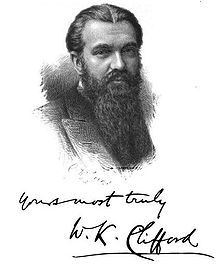
Back ويليام كليفورد Arabic ويليام كليفورد ARZ ویلیام کینقدم کلیفورد AZB Уільям Кінгдан Кліфард Byelorussian উইলিয়াম কিংডন ক্লিফোর্ড Bengali/Bangla William Kingdon Clifford Catalan William Kingdon Clifford Czech William Kingdon Clifford German William Kingdon Clifford Esperanto William Kingdon Clifford Spanish
William Clifford | |
|---|---|
 William Kingdon Clifford (1845–1879) | |
| Born | 4 May 1845 |
| Died | 3 March 1879 (aged 33) Madeira, Portugal |
| Alma mater | King's College London Trinity College, Cambridge |
| Known for | Clifford algebra Clifford's circle theorems Clifford's theorem Clifford torus Clifford–Klein form Clifford parallel Bessel–Clifford function Dual quaternion Elements of Dynamic |
| Spouse | Lucy Clifford (1875–1879) |
| Scientific career | |
| Fields | Mathematics Philosophy |
| Institutions | University College London |
| Doctoral students | Arthur Black |
William Kingdon Clifford FRS (4 May 1845 – 3 March 1879) was a British mathematician and philosopher. Building on the work of Hermann Grassmann, he introduced what is now termed geometric algebra, a special case of the Clifford algebra named in his honour. The operations of geometric algebra have the effect of mirroring, rotating, translating, and mapping the geometric objects that are being modelled to new positions. Clifford algebras in general and geometric algebra in particular have been of ever increasing importance to mathematical physics,[1] geometry,[2] and computing.[3] Clifford was the first to suggest that gravitation might be a manifestation of an underlying geometry. In his philosophical writings he coined the expression mind-stuff.
- ^ Doran, Chris; Lasenby, Anthony (2007). Geometric Algebra for Physicists. Cambridge, England: Cambridge University Press. p. 592. ISBN 9780521715959.
- ^ Hestenes, David (2011). "Grassmann's legacy". From Past to Future: Graßmann's Work in Context. Basel, Germany: Springer. pp. 243–260. doi:10.1007/978-3-0346-0405-5_22. ISBN 978-3-0346-0404-8.
- ^ Dorst, Leo (2009). Geometric Algebra for Computer Scientists. Amsterdam: Morgan Kaufmann. p. 664. ISBN 9780123749420.
© MMXXIII Rich X Search. We shall prevail. All rights reserved. Rich X Search